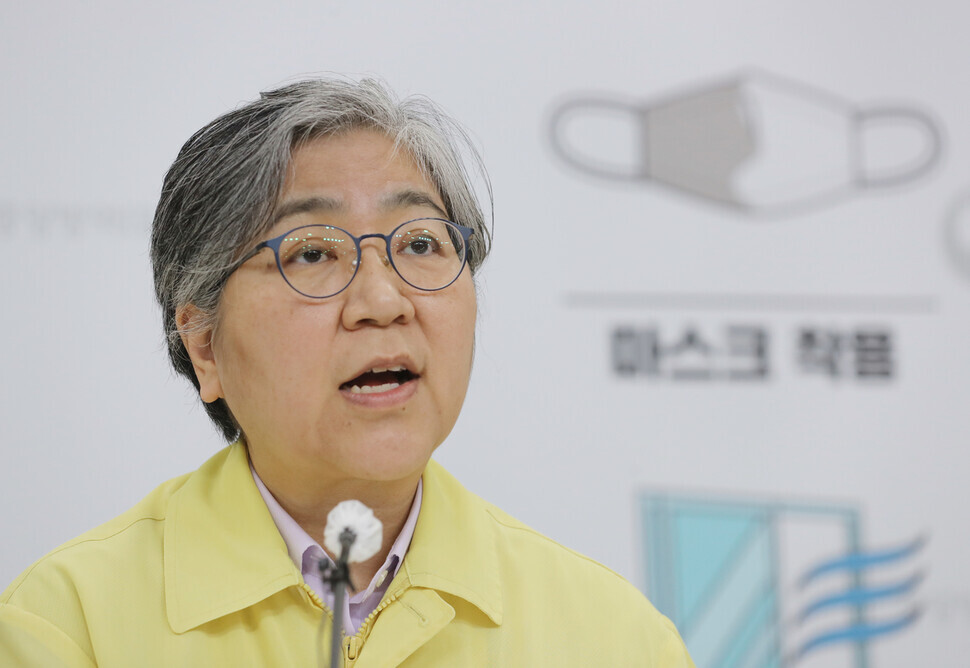hankyoreh
Links to other country sites 다른 나라 사이트 링크
KDCA commissioner says S. Korea can see daily COVID-19 caseload of 2,140 in late July

South Korea’s disease control authorities predicted that, if the current surge of COVID-19 cases worsens, the daily caseload could reach 2,140 by the end of July. They also said that the Delta variant of the coronavirus could become dominant in Korea in mid-August.
“A joint analysis of mathematical models with experts from the private sector showed that the number of daily cases will reach about 1,400 by the end of July at current levels and 2,140 if the current situation gets worse,” said Jeong Eun-kyeong, commissioner of the Korea Disease Control and Prevention Agency, in the daily briefing on Thursday.
The researchers used an infectious disease modeling approach that predicts changes in COVID-19 infections using simultaneous differential equations that model uninfected individuals’ exposure to, infection with, and recovery from the coronavirus.
Jeong also outlined a more positive scenario.
“If we suppress the spread of the disease by actively complying with disease control rules, the daily caseload could start to decline. And if active compliance with social distancing and other rules is combined with the planned vaccine rollout, [the daily caseload] is expected to decrease to 260-415 by the end of September,” she said.
“The rate of increase in new cases over the past week is 53% higher than three weeks ago, leading the Central Disease Control Headquarters to conclude that we’re entering the fourth wave of the pandemic.”
Korea’s Central Disease Control Headquarters (CDCH) also offered a prediction about the spread of the Delta variant.
“Another worrying factor at the moment is the growing prevalence of Delta. The variant’s detection rate is steadily rising, which raises the possibility that it could achieve dominance in August,” the CDCH said, referring to a situation in which Delta would be the most frequently detected of the major coronavirus variants.
Figures released by the CDCH show that Alpha, Delta, and the other major variants accounted for 39.0% of a sample of locally transmitted COVID-19 cases over the past week (June 27-July 3), which was up 8.5 points from the week before (30.5%). A similar pattern was observed in the greater Seoul area, where variants’ proportion of the sample rose from 28.5% to 39.3% over the same period.
In that period, Delta rose from 3.3% to 9.9% of the total sample and from 4.5% to 12.7% among Seoul area cases in the sample.
By Choi Ha-yan, staff reporter
Please direct comments or questions to [english@hani.co.kr]

Editorial・opinion
![[Guest essay] Maybe Korea’s rapid population decline is an opportunity, not a crisis [Guest essay] Maybe Korea’s rapid population decline is an opportunity, not a crisis](https://flexible.img.hani.co.kr/flexible/normal/500/300/imgdb/original/2024/0430/9417144634983596.jpg) [Guest essay] Maybe Korea’s rapid population decline is an opportunity, not a crisis
[Guest essay] Maybe Korea’s rapid population decline is an opportunity, not a crisis![[Column] Can Yoon steer diplomacy with Russia, China back on track? [Column] Can Yoon steer diplomacy with Russia, China back on track?](https://flexible.img.hani.co.kr/flexible/normal/500/300/imgdb/original/2024/0430/1617144616798244.jpg) [Column] Can Yoon steer diplomacy with Russia, China back on track?
[Column] Can Yoon steer diplomacy with Russia, China back on track?- [Column] Season 2 of special prosecutor probe may be coming to Korea soon
- [Column] Park Geun-hye déjà vu in Yoon Suk-yeol
- [Editorial] New weight of N. Korea’s nuclear threats makes dialogue all the more urgent
- [Guest essay] The real reason Korea’s new right wants to dub Rhee a founding father
- [Column] ‘Choson’: Is it time we start referring to N. Korea in its own terms?
- [Editorial] Japan’s rewriting of history with Korea has gone too far
- [Column] The president’s questionable capacity for dialogue
- [Column] Are chaebol firms just pizza pies for families to divvy up as they please?
Most viewed articles
- 1After election rout, Yoon’s left with 3 choices for dealing with the opposition
- 2‘We must say no’: Seoul defense chief on Korean, USFK involvement in hypothetical Taiwan crisis
- 3First meeting between Yoon, Lee in 2 years ends without compromise or agreement
- 4Why Kim Jong-un is scrapping the term ‘Day of the Sun’ and toning down fanfare for predecessors
- 5[Guest essay] Maybe Korea’s rapid population decline is an opportunity, not a crisis
- 6Under conservative chief, Korea’s TRC brands teenage wartime massacre victims as traitors
- 7Two factors that’ll decide if Korea’s economy keeps on its upward trend
- 8Months and months of overdue wages are pushing migrant workers in Korea into debt
- 9Noting shared ‘values,’ Korea hints at passport-free travel with Japan
- 10AI is catching up with humans at a ‘shocking’ rate